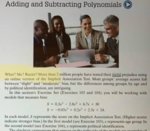



54 math textbooks were banned from use by the Florida Department of Education for implementing topics banned by recent legislation. Now, the state is offering a look as to what some of the rejected books contained.
On April 15, the FDOE announced that it had rejected 41 percent of textbooks that were submitted to the department. The books were rejected for either not meeting state standards, implementing Common Core, implementing Social Emotional Learning, or by implementing a banned topic like critical race theory.
The books were submitted to the state after the department called on publishers to submit proposed math textbooks to be included on the state’s adopted list. Only 78 books were added to the state’s list of adopted materials.
“We’re going to ensure that Florida has the highest-quality instructional materials aligned to our nationally-recognized standards,” said Commissioner of Education Richard Corcoran, who is stepping down from his position at the end of April.
One of the examples provided by the state has a question that begins with the phrase “What? Me? Racist?” The question then goes on to mention the Implicit Association Test—a test engineered by Harvard University that measures the strength of associations between concepts like race—and how people have tested their racial prejudice. It’s unknown what textbook or from which publisher the question came from.
Other included examples show that some books have units specifically dedicated to Social Emotional Learning. SEL is a concept that integrates social and emotional skills for students into school curriculum. One example says SEL will help students “build proficiency with social awareness as they practice empathizing with classmates.”
“It is unfortunate that several publishers, especially at the elementary school grade levels, have ignored this clear communication and have attempted to slip rebranded instructional materials based on Common Core Standards into Florida’s classrooms, while others have included prohibited and divisive concepts such as the tenants (sic) of CRT or other unsolicited strategies of indoctrination,” said the department in a press release.
Publishers do have the ability to appeal a decision to not adopt one of their books onto the state’s approved list.
Other items that may interest you

